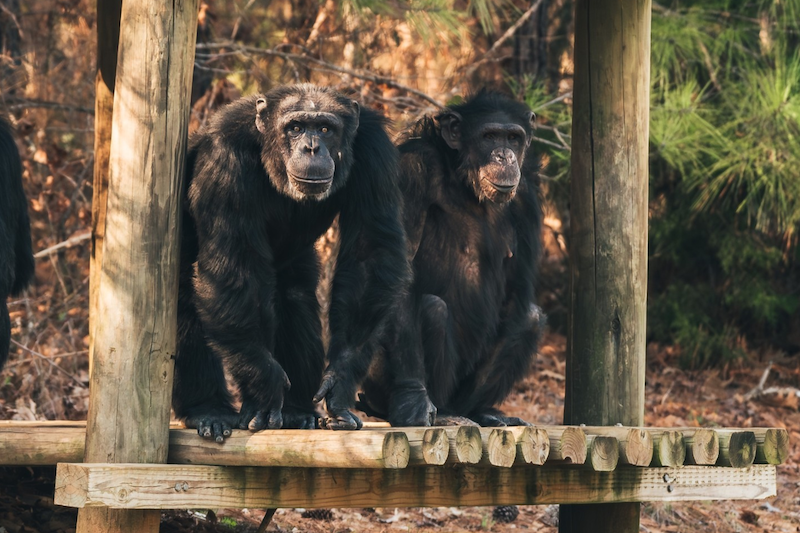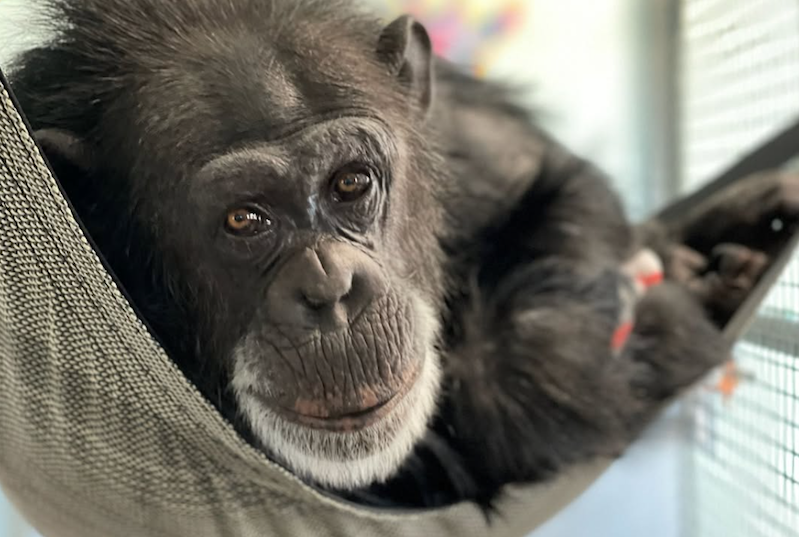


Five ways Jane Goodall lives on at UD
Photos courtesy of Erika Fleury, Sarah Lacy, Stella Pettit, North American Primate Sanctuary, Save the Chimps, Chimpanzee Sanctuary Northwest, Center for Great Apes and Chimp Haven October 09, 2025
Blue Hens carry her torch into a new era
Scientists rarely ascend to celebrity status. But primatologist Jane Goodall, who passed away this month at 91, enjoyed movie star-level fame.
Just ask University of Delaware alumna Erika Fleury, Class of 2003. A longtime director with the North American Primate Sanctuary Alliance, this Blue Hen helped facilitate the care of apes and monkeys rescued or retired from industries like entertainment, biomedical research and the pet trade. Her path crossed with Goodall’s on multiple occasions, and last year she contributed an essay alongside Leonardo DiCaprio, Joaquin Phoenix and Rooney Mara to a book titled: Jane Goodall at 90: Celebrating an Astonishing Lifetime of Science, Advocacy, Humanitarianism, Hope, and Peace.
“She was the most kind, patient and humble woman that I have ever met,” said Fleury, who worked with Goodall’s team on co-founding World Chimpanzee Day. “As accomplished and well known as she was, she always made time for the people who looked up to her, and for that, I’ll be forever grateful.”

In the early 1960s, a time when women were largely absent from scientific field work, Goodall moved to what is now Tanzania’s Gombe Stream National Park. For decades, she studied the area’s chimpanzees, meticulously documenting their complex social bonds, tool use and rich emotional lives. These groundbreaking discoveries — among the most significant of the 20th century — challenged long-held assumptions about what makes humans unique, and they brought a new, ethical urgency to the conservation cause. (It’s the reason Kyle McCarthy, professor of wildlife ecology at UD, chose “Jane” for his youngest daughter’s middle name.)
Goodall also founded an eponymous Institute to protect wildlife, and she dedicated much of her life to environmental education. Sarah Lacy, an assistant anthropology professor at UD who credits Goodall and Indiana Jones as major childhood influences, remembers being an active member in a Canada chapter of Goodall’s youth program, Roots & Shoots. Participating in a donut fundraiser for the organization, “I wrote a song to the tune of ‘I’ve got a lovely bunch of coconuts,’ and I sang it over the school’s announcements: “I’ve got a lovely bunch of donuts, twiddely dee… if you don’t buy one, a chimp will be dead.”

Today, Goodall’s values — integrity, compassion, intellectual curiosity — resonate deeply with the Blue Hen spirit. Her influence lives on in the University researchers and activists she inspired — and their unwavering commitment to trailblazing work that improves the world.
“Goodall never stopped learning or caring, and she never gave up,” Fleury said. “There’s absolutely overlap between what she stood for and what the UD community represents.”
Below are five ways her legacy endures.
Teaching Goodall
It’s a fair assumption that Goodall’s work is a cornerstone of wildlife and environmental education. But because the scientist reshaped our understanding of what it means to be human, you can find her popping up as an intellectual and ethical touchstone in departments across UD — from archaeology to philosophy, psychology to sociology.
Karen Rosenberg, professor of anthropology, notes that her area of focus — the evolution of human parenting and maternal caregiving over time — is largely informed by Goodall’s work with primates.
“She provided the comparative context,” Rosenberg said, adding: “I think she wrote the best popular science book in the world, Through a Window. I’ve probably assigned it 20 times.”

Blending empathy and science
Prior to Goodall’s field work, scientists considered detachment essential to objectivity — in other words, they resisted any emotional connection to their subjects. But Goodall, who named rather than numbered her chimpanzees, proved that empathy and rigorous observation aren’t mutually exclusive; one can beget the other.
Today, this influence is seen across disciplines that study living things, including human beings. Take Alyssa Lanzi, assistant professor in the Department of Communication Sciences and Disorders focused on better understanding and detecting Alzheimer’s disease.
“As a female scientist, I have always strived to follow in the footsteps of pioneers like Jane Goodall, who emphasized the importance of building trust and humanizing participants,” she said. “I strive to instill in my students and lab the importance of connecting deeply with each individual, treating them as if they were family.”
Pioneering immersive fieldwork
Goodall revolutionized not just what scientists observe, but how they observe it. Before her, the study of animals often involved short-term observation in a lab setting. She helped establish long-term, immersive field research as the gold standard — and Blue Hens meet this standard.
Lacy, the UD anthropologist who participated in Goodall’s youth program as a child, once led a National Geographic-funded team of researchers in Kenya on a search for prehistoric human remains.

“I remember being 25 and feeling totally over my head — not knowing the language and being the only woman and only non-Kenyan on the team,” she said, adding that she drew inspiration from Goodall: “It could have only been harder for her.”
Meanwhile, UD students are given ample opportunities to leave the laboratory behind. Undergraduates who take certain conservation classes with Professor Jake Bowman find themselves in Tanzania, just like Goodall, getting within 30 meters of elephants, lions, giraffes, zebras and buffalo.
“We talk about the benefits of being on the ground doing research, versus taking data someone else collected,” he said. “I don’t think you can really understand the system unless you’ve lived the system.”
Connecting research to the broader community
Goodall believed that scientific discoveries, even those as groundbreaking as her own, meant very little if confined to academic journals, and that’s a value that transcends departments at UD.
Through the University’s Cooperative Extension, various K-12 partnerships and countless outreach programs, UD regularly brings science into settings where it benefits real people.

Consider the Coastal Resilience Design Studio reconfiguring entire towns to better withstand storm damage, or experts at the Delaware Geological Survey monitoring the state’s drinking water for contamination. McKay Jenkins, Cornelius Tilghman Professor of English, is part of a team that launched the University’s Master Naturalist Certification Program, which trains regular citizens to learn, love and repair the state’s many landscapes.
“All of this work is of a piece with the message that Jane Goodall promoted globally for decades,” Jenkins said. “That we owe it to the beautiful places we call home to become knowledgeable and dedicated stewards for ourselves, our nonhuman fellow creatures and future generations.”
Finding hope
In the face of so many global crises, from climate change to biodiversity loss to a seeming inability to connect across borders and political camps on a workable path forward, Goodall’s most enduring message is one of hope — not as a form of naive optimism, but as a moral choice.
It’s a stance that resonates with the Blue Hen community, including Stella Pettit, a junior wildlife conservation major who first discovered Goodall through a library video at the age of 5. At 13, she attended a Goodall lecture that “forever changed the trajectory of my life.”

Now at UD, Pettit dedicates herself to protecting — and opening eyes to — the wonders of the natural world. She serves as president of the Wildlife Society student group, she devotes time to the Four Youth organization in Wilmington, teaching underprivileged kids about sustainable agriculture, and she “can talk for hours” about a study abroad trip to Costa Rica where she collected data on everything from bat caves to cloud forests.
She’s under no illusions about the uphill battle that is working toward a Goodall-approved future, but discovering a network of support at UD strengthens her resolve.
“We all feel the weight of carrying on this woman’s legacy, but she taught us that one person can make a difference,” Pettit said. “If I can bring an energy to my community that represents unity, empathy and curiosity — all things Goodall represented — that means more to me than any degree.”
Contact Us
Have a UDaily story idea?
Contact us at ocm@udel.edu
Members of the press
Contact us at mediarelations@udel.edu or visit the Media Relations website

